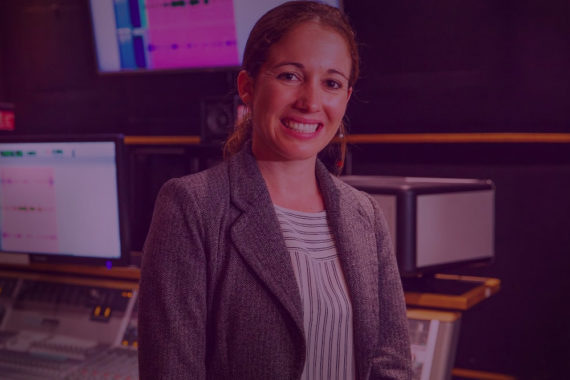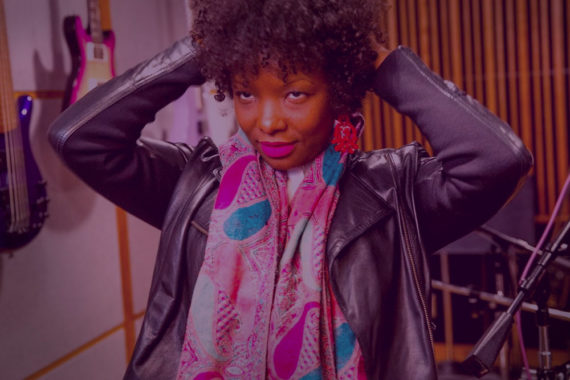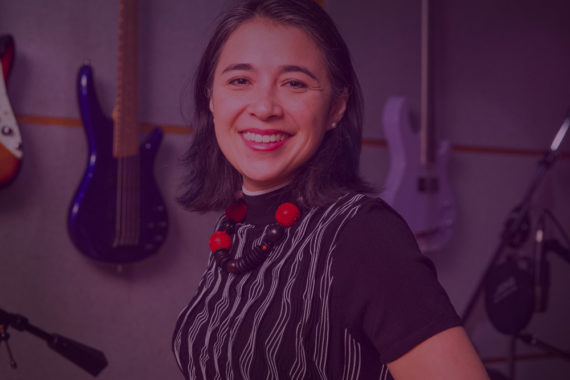
DeShuna Spencer, Founder and CEO, kweliTV
(photo credit: Kat Araujo)
Pitch Makeover host Natalia Oberti Noguera gets the 60-second pitch from entrepreneur DeShuna Spencer of kweliTV, a streaming platform with documentaries and series for the global Black community. Tune in as Natalia advises DeShuna on what to keep, delete, and add to her pitch. In the Legal Minute, Mitzi Chang of Goodwin answers common startup legal questions. Our First Pitch segment explores DeShuna’s pitch evolution. Plus, this week’s Investor Take from Ruth Ann Harnisch of The Harnisch Foundation.
Music courtesy of Seven Seas Music (a Pipeline Angels portfolio company!)
EPISODE TRANSCRIPT
by Tatiana Flowers
Natalia: Hi everyone, my name is Natalia Oberti Noguera. I am the Host and Creator of Pitch Makeover and I’m also the Founder and CEO of Pipeline Angels, where we are changing the face of angel investing and creating capital for women and nonbinary femme social entrepreneurs.
Gina: And I’m Gina Delvac, the Founding Executive Producer of Pitch Makeover. We’re taking the concept of a fashion makeover and applying it to startup pitches. Entrepreneurs pitch, we talk, and then we share some feedback on what they should keep, delete, and maybe even more importantly –add to their pitch. Our goal: help more voices, as Rihanna says, shine bright like the diamonds that they are.
And after the Pitch Makeover we have the Legal Minute with Mitzi Chang of Goodwin, answering burning startup legal questions, followed by First Pitch. And stay till the end for this week’s Investor Take from Ruth Ann Harnisch of The Harnisch Foundation.
Natalia: We’re back at it. Welcome to Pitch Makeover. I am [1:00] thrilled to introduce DeShuna Spencer, Founder and CEO of kweliTV, and kweliTV is going to be undergoing a pitch makeover today. Are you ready for it?
DeShuna: I am ready!
Natalia: Awesome! So before anything, without further ado, we want to check out your one-minute pitch so we’re going to have Gina our phenomenal podcast producer time you. So, ready?
DeShuna: I’m ready.
Natalia: Set.
DeShuna: Yes!
Natalia: Go!
DeShuna: I am DeShuna Spencer. I’m the CEO of kweliTV. We are an interactive video-streaming service dedicated to the issues, stories, and culture of the global Black community. We have independent films, documentaries, web shows, and news programing for the entire African diaspora. We’re talking North America, Europe, Latin America, the Caribbean, and, of course Africa, all streaming from one location. Kweli, if you don’t know, means truth in Swahili, so our mission is to curate content that is a true reflection of the Black experience. [2:00] So, we launched beta fifteen months ago. We have over 15,000 registered users, we have over 1,300 paid beta subscribers, we’ve made about US$50,000 to date, and about 80% of our subscribers are based in the U.S. and we have 20,000–20% of our subscribers are actually outside of the U.S., and that’s basically through word of mouth, earned media, and social media, so we’re really excited about where we’ve gotten so far with our beta.
Gina: 59 seconds.
Natalia: Well, congrats, DeShuna.
DeShuna: Thank you.
Natalia: So the things that stood out to me, you mentioned first of all, that this is really geared toward the African diaspora. So talk to me a more about the market, like numbers, and how come you wanted to focus on that community.
DeShuna: Sure, so there are about 1.4 billion people worldwide who are of African descent and the reason I decided to start kweliTV was because I was really frustrated with the people, or at least the stories I saw in mainstream media, the characters. Anyone who watches mainstream media [3:00], sometimes you’ll see reality television, women are fighting each other, or you watch one of those Black networks, you see a bunch of reruns from the 80s or 90s, or, I like the History channel and if you turn on the History channel on a month other than February, you’d think that Black people–or, anyone of color actually–play absolutely no role, not only in American history but in history in general, like we haven’t made a mark around the world, and so I was really frustrated because I couldn’t find enough positive images, enough history and culture that really spoke to me, and so I remember looking online for an alternative. I subscribe to Netflix and I couldn’t find the content I was looking for and so when I was doing some research, I was like, I wish there was a Black platform that would really focus on independent films and documentaries, and when it didn’t exist, I was like hmm, maybe I should do it, and so the journey began from there literally. Just wanted to see independent films, wanted to see documentaries I read about online and social media that were in film festivals, unless I travelled like hundreds of miles [4:00] to go to a film festival to see that particular film or documentary and so, for me, it was almost selfish in a way because I wanted to see all these great documentaries and films that I saw or read about online and I didn’t really have the resources to travel to wherever I needed to go to a film festival. So I was like I wish I could have it all in one location and that’s how kweliTV was really born.
Natalia: That’s super hopeful and thank you for sharing. You mentioned “truth” in Swahili.
DeShuna: Yes.
Natalia: So, tell me more about what sort of feedback you’ve gotten regarding both your decision to call it that and how has that guided your company and your startup.
DeShuna: It guides everything that I do. I remember when I was coming up with the idea for kweliTV. I was trying to think of a name that really represented what was in my head. And I wanted the name to be Swahili because most people–there are a lot of African languages but Swahili is the language that most people are familiar with, so I was wanting it [5:00] first to be a Swahili name. And then I was looking online just trying to figure out what would be the name that would best represent what I was looking to do and “truth” was what really came to mind because, well, the reality, yeah, there are people who do fight in real life, but that’s not the only reality of the Black community and I wanted to show a true reflection so when we’re curating content, when we’re looking for content to put on the platform, that is always what comes to mind. Is this a true reflection? Does this include demeaning content, or content that is stereotypical, or content that’s showing the same type of negative stereotypes, or the same type of–same narratives we typically see of the kid who goes wrong, gets shot at the end, or the ghetto Black women who are angry and loud. I wanted to show something different and really show the different facets of the community, not just in America but around the world. So “true” is: what’s true for Afro-Cuban, [6:00] what’s truth for Nigeria, what’s truth for Ghana, what’s truth for African people living in France? I really wanted to show the Black experience around the world, something that we just don’t get a chance to see on cable–or anywhere, for that matter.
Natalia: Ok, so are you ready for your pitch makeover?
DeShuna: Sure.
Natalia: One of the things that I, especially during our conversation, I thought was super helpful that you brought up and I personally know that it’s a really–at least it evokes a lot when you use the words “first user founder,” you know, and that’s what you were, you were the first user, so you actually knew the market because you were the market.
DeShuna: Right.
Natalia: So, in terms of something that I’d love for you to add, I’d say is this first user founder and your story on like what frustrated you.
DeShuna: Right, right.
Why did you think that kweliTV needed to exist and be part of this world? This is both keep and add, [7:00] all those numbers that you shared are so important. The fact that like you have over 15K registered users, that’s awesome! You know, there are tons of startups out there–
DeShuna: That’s true.
Natalia: –that don’t have those numbers, don’t have that traction and so being able to have you underscore that it’s not just first user founder, there’s a market that you represent that is big enough, that right now you have over 15K is phenomenal. So I want to make sure you keep that, slash add it. In terms of just how big is this opportunity? You know, it’s one thing to say the African diaspora, it’s another thing to say 1.4 billion people worldwide with African descent, right? Like that’s a big, huge number and it helps get people’s attention in terms of how big the opportunity could be, so I’d love for you to make sure that you keep African diaspora and you add [8:00] the number, 1.4 billion. And, I’d say, in terms of–I really appreciated your going a little bit more in depth of like why naming kweliTV “kweli” and that “kweli” means “truth” in Swahili. And, the parts that I’d say that really resonated and I’d love for you to add to the pitch are acknowledging that you mentioned like a lot people are familiar with Swahili and so just acknowledging that this is something that is unique, you’re also looking for that common thread or that commonality, right, like, so that’s really important. And then, the other part that you talked about, like just what “truth” means in this context. You said, and I wrote it down, “true reflection versus negative stereotypes, negative narratives” and then what I also loved was that you said, “the different facets of the community,” right? And so that made me think, yes, it’s Truth, it’s with a capital “T” [9:00] because there are lowercase truths. There’s so many truths out there right? And then I loved how like the different truths there are out there, you actually listed them, like African people living in France, Afro-Cubans, Black people living in Germany, like you actually made it feel like it goes beyond just like that 1.4 billion people. You’re actually humanizing what those examples are and giving someone that visual of like, these peeps, you know, like living in different countries and still being part of this Truth with a capital T, right? So, I’d love for you to add, you know, more on that. So, I’d say like, and this is the awesome thing, whenever we have had an entrepreneur that has like a shorter than one-minute pitch, is that like, yay, you get to keep and add, and there isn’t much room to delete! (Laughs)
DeShuna: Right, right. I think a lot of times people have a hard time with one minute. Like, you know, you go to pitch competitions, typically, they’re either five minutes [10:00] or they’re two minutes, so, the one minute can be difficult. (Laughs)
Natalia: Well, that’s why we’re doing this pitch makeover. So, just to sum it up, I’d say keep over 15K registered users, delete, you know, like that’s, n dash–what is it like? n dash a, not available, and add first user founder, 1.4 billion people worldwide with African descent, and then a bit more context regarding what truth means to you in the context of launching kweliTV. Are you ready for the pitch makeover?
DeShuna: We’ll go for it. We’ll see how it comes out.
Natalia: Ready, set, go.
DeShuna: I’m DeShuna Spencer and I’m the founder of kweliTV. We are an interactive video streaming service dedicated to the issues, stories, and culture of the global Black community. Kweli means “truth” in Swahili so our mission is to curate content that is a true reflection of the Black experience. The idea from kweliTV came to me a couple [11:00] years ago because I was really frustrated. I didn’t see enough positive images that reflected me as a Black person and so, I was like, hmm, what if there is a Black subscription service that will show enough positive images affecting people whether Afro-Cuban, African-American, Afro-Latino, or Black in Brazil, and that’s what kweliTV is all about. We have content from North America, Europe, Latin America, the Caribbean, and Africa–all streaming in one location. There are currently 1.4 billion people worldwide of African descent and we launched our beta about fifteen months ago, and we have over 15,000 registered users. We have over 1,300 paid beta subscribers since launching just fifteen months ago.
Gina: 1 minute, 1 second.
DeShuna: (Laughs)
Natalia: One minute, one second per podcast producer–Pitch Makeover podcast producer–Gina Delvac. That is awesome. So, how do you think that went? What are your thoughts on like… [12:00]
DeShuna: Off the cuff, I would give it a 5 because I was like thinking off the top of my head so I feel like I messed up a bit in my head but I think, overall, I think I did a great job.
Natalia: And, obviously, you were talking about a 5 out of 5!
DeShuna: Okay. Great! I feel better. (Both laugh.)
Natalia: Like, tell me about, like, what you think, in terms of the original pitch that you did versus the pitch makeover.
DeShuna: Okay. Well, so, it was definitely better. I think my first pitch was too short. I felt I just wanted to kind of get it out the way without really giving more information and sometimes when you only have one minute, you probably need to give more information, especially if it’s like an investor, or somebody like they say the elevator pitch, where you’re in an elevator with someone or you’re in a cab with someone–and you only have like–or Lyft, whatever we use these days, and we just only have a short period of time to talk to someone. One minute is all you have, so you really want to, you know, try to cram in as much as possible, so I think I definitely did a better job at cramming in more information for a potential investor or whoever else wants to know more about kweliTV. [13:00]
Natalia: Well, and I loved it because you made sure to integrate, well, first of all, what it is, you know, like you had the streaming service, which is so–it sounds like you already have it, you know, like, down pat, like, you know, like, this is what it is (emphasis).
DeShuna: Yeah. (Laughs)
Natalia: You also answered why, which is such an important question, you know, and I feel like I got such a much better sense on the why from, like, your pitch makeover and then you also answered the what. And, often times, people spend so much time focused on, like, the why or the how–
DeShuna: Right.
Natalia: –that it’s so important to just talk about the what. And, so maybe, like, we generally, have these, like, these pitch makeover tip of like today’s episode and I’d say it’s like just remembering the why and also not forgetting the what because being able to describe what it is that you’re building and creating, and for me, that was like the truth part of it, right? Like, you’re creating [14:00] truths, you’re creating truth, and that’s just so powerful, and I’m so glad that we’re getting to connect so thank you for that DeShuna.
DeShuna: Thank you.
Gina: Next up is the Legal Minute with Mitzi Chang. Stay tuned after that for First Pitch.
I’m back with Mitzi Chang of Goodwin for the Legal Minute here on Pitch Makeover. Mitzi, we’ve talked before about the common documentation errors that you see founders bring to you when it’s all a mess and they later realize they need to have a lawyer fix their stuff for them. What are the common problems when it comes specifically to intellectual property?
Mitzi: So intellectual property is really the basis for your company and one thing that we often see is that the company doesn’t own its IP which is a huge problem. So, you want to make sure that when you form your company, you have the right documentation that says anybody who works for your company, the company actually owns the intellectual property. It’s not an individual, but it’s the company because investors are going to invest in your company, not in an individual so you just want to make sure that [15:00] the documentation is there. You know, sometimes, you can go back and retroactively fix it but that might, you know, if there was some random person that worked for you five years ago, that might entail going back to that person who built some code for you. So, I always recommend making sure you have the proper documentation when you have people sign up as employees or contractors.
Gina: And what’s an example of that? Is this like a work services agreement, or an NDA, or are we talking about different things here?
Mitzi: Sure, so for employees, it’s called a PIIA, which is Proprietary Inventions and Assignment Agreement and basically that covers any work that you as an employee does is owned by the company. That’s similar to a consulting agreement that has a work for hire clause, so it’s essentially the same thing but for different classes of either an employer or consultant who work for the company.
Gina: Thanks Mitzi.
Mitzi: Sure, no problem.
Gina: Now, we’re back with entrepreneur DeShuna Spencer and our segment, First Pitch.
Natalia: Tell me about your first pitch.
DeShuna: So, my first, [16:00] first pitch was actually for another company I started many years ago. It was emPower magazine and I was a finalist for this business plan competition. I flew to Chicago and I had never pitched before. It was almost like American Idol. That’s kind of how I felt. And, all these judges were actually kind of mean (laughs). They were really mean and I remember one of the guys, I was probably, at the time, early twenties, and so this was a long time ago, and he was asking me had I been to Folio in New York and gone to any of the events or the conference. I was like, “Well, no, I can’t afford it. The conference is like, you know, a few US$200 and I’m making like US$20,000.” I wasn’t making a lot of money. He was like, “Well, how much is that suit you have on? How much are those shoes?” I was like, “I got this suit from”–it was like D–it was a little cheap suit from–
Natalia: Yeah.
DeShuna: –like Rave, or something, or Forever 21 and I got my shoes, I’m like, DSW. I was like, “I probably spent like fifty bucks for this.” “Well, you know, sometimes women, [17:00] if–you know, you guys spend your money on your clothes, and shoes, and hair but not spend money on your business.” And, I froze.
Natalia: Yeah.
DeShuna: I didn’t even know how–first of all, I was, like, you know, young, really young. I didn’t even know what to say. So, after that, I didn’t pitch for a very long–I would say probably about ten years–
Natalia: Wow.
DeShuna: –when I started kweliTV. I was so afraid to pitch again because after that experience, when I walked out, I burst out crying and I’m not even a crier like that. I’m typically a strong, you know, woman but I cried walking out and the producer was like, “You did such a great job!” And, I was like, “I did? (emphasis) like I suck. He told me that I care more about my clothes and my hair than my business.” And so, ten years later, I pitched for kweliTV, which was in 2014, and that was my second pitch. I was a finalist for kweliTV and we had to practice pitch at some conference that was actually in DC and I was so nervous [18:00] because I was still thinking about that other pitch like ten years before that and I did a good job with that pitch. We had fifteen minutes, they were very nice to us, all women, so they were very warm, not that men can’t be warm, but they were all very warm and really gave me positive feedback on how I could make my pitch better and I would say that, at the time, I thought I needed fifteen minutes and when they said they were going to give us three minutes, later, I just couldn’t imagine. It was really hard for me to do that, but I’ve been pitching now, gosh, now for–in the past two years, I’ve probably pitched at least every other month–different competitions or accelerators to get into–so I pitch an awful lot now and I’ve gotten over that fear from when I was really young. Now I can do it but I had to get over that hump.
Natalia: Yeah.
DeShuna: So that was my first original pitch.
Natalia: Well, and I’m sure that a part of it, especially since you mentioned that it was kind of like a reality TV show–
DeShuna: Yeah.
Natalia: –like, vibe, that it was quote unquote good TV that they were looking to do, right? [19:00]
DeShuna: Right, right.
Natalia: And, at the same time, it just for me, was so poignant because you were there to pitch emPower magazine and so that whole experience is almost like Exhibit A on why we need to fund emPower magazine–
DeShuna: Exactly. (Laughs)
Natalia: –why we need emPower magazine. So, well, I’m so glad that got yourself–what’s the saying? Like, you got yourself back on the horse, and, you know, like, ten years later, and now you’re doing kweliTV and (emphasis) the fact that, like, your first pitch for kweli–for kweliTV was, like, a positive one, right?
DeShuna: And, I won–eventually won that money–it was US$20,000. I won that pitch. (Laughs)
Natalia: Congratulations. How about–do you remember, like, your most recent pitch that you’ve done for kweliTV and how did that go?
DeShuna: My most recent pitch was three weeks ago at Harvard Business School. I won that pitch competition, as well–
Natalia: Congrats!
DeShuna: –US$10,000. So, it was my first time at Harvard–definitely, Harvard Business School. I was actually really nervous. I’m not as nervous anymore, but, I’m from Memphis, Tennessee. [20:00] My parents are working class people and to go to Harvard and pitch there, I wanted to make sure I represented my community, my culture well as a Black woman. And, so, I remember I got to Harvard–I got there the night before, and, that morning, I woke up at 5 AM, and I looked in the mirror and I practiced from 5 AM till about 3 [PM] over and over again. I took like an hour break to eat but I kept practicing over and over again. We had five minutes, I had my timer on, and every time I would kind of veer off, I would start over again and I was determined to win that money, I was determined to make sure that I represented my company well, and myself well, so, I won that one, as well, so, I was really excited about that (laughs)–that was just three weeks ago! (Laughs)
Natalia: Well, that’s so exciting, and, especially for, like, any of the aspiring entrepreneurs or those who are like, “Why–why go back out there to pitch?” This is such an inspiring story and thank you so much for sharing, DeShuna. This is–the aha moment that I just had, DeShuna, [21:00] which is, you are kweli.
DeShuna: Aww.
Natalia: You are truth.
DeShuna: Thank you.
Natalia: So thanks for sharing your truth with us, okay?
DeShuna: Thank you–and that’s my life journey. I feel like being authentic–my goal is always to be authentic no matter where I am, no matter where I go, so thank you. I’m happy that you see that. (Laughs)
Natalia: Yes! Gimme five!
DeShuna: Five!
Natalia: Yay!
DeShuna: You can’t see us giving each other high five, but you know.
(Both laugh.)
Natalia: Well, thanks so much for joining us!
DeShuna: Thank you! Thanks for having me. My first time in Brooklyn so, you know, happy to be here.
Natalia: Yes! And, on that note, thank you for, like, the shout-out. We are at Bondfire Radio, which is a recording studio owned by a Black woman, TK, and a Black guy, Conscious, and so we are supporting #morevoices in our supply chain, as we continue to produce and create more podcasts.
Gina: This season’s Investor Take is brought to you by Ruth Ann Harnisch of The Harnisch Foundation and today’s Investor Take is watch Shark Tank. [22:00] Natalia, why should entrepreneurs be watching Shark Tank?
Natalia: Hello. I love TV, so I love this Investor Take, Ruth Ann. I will say, like, let’s try to get a woman of color on the show (laughs). A woman of color shark! Let’s do it! It’s important to watch it cause it’s great to see the back and forth between the entrepreneurs and the investors and I will say that, Ruth Ann, guess what, we’re creating this podcast so that next time that you have to give one of these Investor Takes, you can say listen to Pitch Makeover.
Gina: That’s today’s Investor Take. Thank you again to Ruth Ann Harnisch and The Harnisch Foundation.
Subscribe to Pitch Makeover anywhere you’re listening right now, including Google Play or Apple Podcasts, where we’d love for you to leave us a review. More information and show notes are at pitchmakeover.com and we’re everywhere on social media @PitchMakeover.
Natalia: Thanks for joining us. This has been Pitch Makeover. Now, go out and take over!



